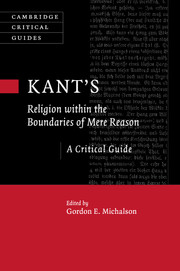Book contents
- Kant’s Religion within the Boundaries of Mere Reason
- Series page
- Kant’s Religion within the Boundaries of Mere Reason
- Copyright page
- Contents
- Contributors
- Translations and abbreviations
- Introduction
- Chapter 1 Holy Scriptures within the boundaries of mere reason: Kant’s reflections
- Chapter 2 The evil in human nature
- Chapter 3 Radical evil and human freedom
- Chapter 4 Gesinnung: responsibility, moral worth, and character
- Chapter 5 Rational hope, possibility, and divine action
- Chapter 6 Kant on grace
- Chapter 7 Kant, miracles, and Religion, Parts One and Two
- Chapter 8 Kant’s Jesus
- Chapter 9 Pluralism in the ethical community
- Chapter 10 Kant’s religious constructivism
- Chapter 11 What does his Religion contribute to Kant’s conception of practical reason?
- Chapter 12 Culture and the limits of practical reason in Kant’s Religion
- Bibliography
- Index
Chapter 10 - Kant’s religious constructivism
Published online by Cambridge University Press: 05 May 2014
- Kant’s Religion within the Boundaries of Mere Reason
- Series page
- Kant’s Religion within the Boundaries of Mere Reason
- Copyright page
- Contents
- Contributors
- Translations and abbreviations
- Introduction
- Chapter 1 Holy Scriptures within the boundaries of mere reason: Kant’s reflections
- Chapter 2 The evil in human nature
- Chapter 3 Radical evil and human freedom
- Chapter 4 Gesinnung: responsibility, moral worth, and character
- Chapter 5 Rational hope, possibility, and divine action
- Chapter 6 Kant on grace
- Chapter 7 Kant, miracles, and Religion, Parts One and Two
- Chapter 8 Kant’s Jesus
- Chapter 9 Pluralism in the ethical community
- Chapter 10 Kant’s religious constructivism
- Chapter 11 What does his Religion contribute to Kant’s conception of practical reason?
- Chapter 12 Culture and the limits of practical reason in Kant’s Religion
- Bibliography
- Index
Summary
- Type
- Chapter
- Information
- Kant’s Religion within the Boundaries of Mere ReasonA Critical Guide, pp. 193 - 213Publisher: Cambridge University PressPrint publication year: 2014
- 2
- Cited by

